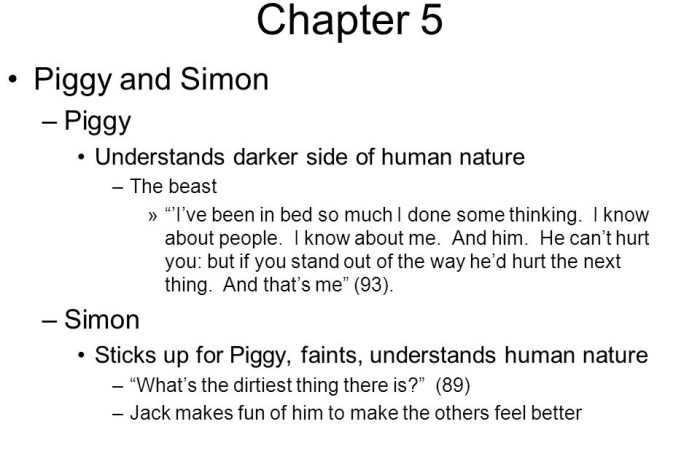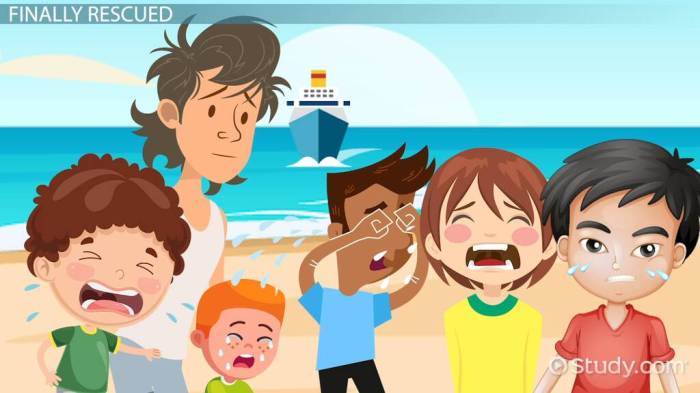Chapter 12 lord of the flies quotes – Chapter 12 of William Golding’s Lord of the Flies offers a profound exploration of human nature through a series of compelling quotes that illuminate the characters’ motivations, foreshadow future events, and contribute to the novel’s overarching themes. By analyzing these quotes within the context of symbolism, foreshadowing, and literary techniques, we gain a deeper understanding of the complexities of human behavior and the enduring power of Golding’s masterpiece.
The characters in Chapter 12 are vividly portrayed through their words, revealing their strengths, weaknesses, and inner conflicts. From Ralph’s unwavering belief in order to Jack’s descent into savagery, each quote provides a glimpse into the characters’ evolving identities and the moral dilemmas they face.
Characterization through Quotes

In Chapter 12 of Lord of the Flies, William Golding employs a series of significant quotes to reveal the characters’ personalities and motivations. These quotes provide insights into the strengths and weaknesses of the characters, shaping the narrative and contributing to the novel’s overall themes.
Ralph
- “I’m chief. I’ll go.”
- “We’ve got to have rules and obey them. After all, we’re not savages.”
These quotes demonstrate Ralph’s sense of responsibility, his commitment to maintaining order, and his belief in the importance of civilization.
Jack
- “I’m not going to play any longer. Not with you.”
- “We’ll hunt and have fun. If you want to join us, come on. If not, don’t.”
These quotes reveal Jack’s growing desire for power and his rejection of the rules and responsibilities of civilization.
Simon
- “What I mean is… maybe it’s only us.”
- “You’ll get back to where you came from.”
These quotes highlight Simon’s intuitive understanding of the true nature of the island and his belief in the possibility of redemption.
Symbolism and Motifs
Chapter 12 of Lord of the Flies is replete with symbols and motifs that contribute to the novel’s themes and overall meaning.
The Lord of the Flies
The Lord of the Flies represents the primal instincts and savagery that lurk within all humans. Its appearance on the island symbolizes the breakdown of civilization and the descent into chaos.
The Fire
The fire serves as a symbol of both hope and destruction. It provides warmth and protection but also poses a constant threat of danger.
The Conch
The conch symbolizes order and civilization. Its destruction by Jack and his followers represents the triumph of savagery over reason.
Foreshadowing and Suspense
Golding employs a variety of foreshadowing techniques in Chapter 12 to create suspense and anticipation for future events.
Simon’s Premonition
Simon’s encounter with the Lord of the Flies foreshadows the impending danger and violence that will befall the group.
The Broken Conch
The destruction of the conch foreshadows the final breakdown of order and the triumph of savagery.
The Hunt for Ralph
The hunt for Ralph foreshadows the ultimate confrontation between the forces of civilization and savagery.
Literary Techniques

Golding employs a range of literary techniques in Chapter 12 to enhance the reader’s understanding and engagement with the text.
Imagery
Golding uses vivid imagery to create a sense of place and atmosphere, immersing the reader in the island’s primal and dangerous environment.
Metaphor
Golding employs metaphors to explore the complex themes of the novel, such as the comparison of the island to a “heart of darkness.”
Irony
Golding uses irony to highlight the characters’ flaws and the futility of their attempts to maintain civilization.
Connections to Other Chapters: Chapter 12 Lord Of The Flies Quotes
Chapter 12 of Lord of the Flies builds upon and connects to events and themes explored in earlier chapters.
The Breakdown of Civilization, Chapter 12 lord of the flies quotes
Chapter 12 continues the novel’s exploration of the breakdown of civilization, as the boys descend further into savagery and violence.
The Conflict between Good and Evil
The chapter intensifies the conflict between the forces of good, represented by Ralph, and the forces of evil, represented by Jack.
The Loss of Innocence
The events of Chapter 12 underscore the loss of innocence as the boys confront the true nature of humanity.
Historical and Cultural Context
Lord of the Flies was written in the aftermath of World War II, a time of great disillusionment and skepticism about human nature.
The Influence of World War II
The novel reflects the author’s experiences of the war, particularly the horrors he witnessed during the bombing of Dresden.
The Cold War
The Cold War’s fears of nuclear annihilation and the threat of global conflict also influenced the novel’s themes of violence and destruction.
FAQ Guide
What is the significance of Ralph’s quote, “I’m chief. I’ll go first”?
This quote demonstrates Ralph’s sense of responsibility and his commitment to leading the group. It also foreshadows his eventual downfall as he struggles to maintain order in the face of growing savagery.
How does the conch symbolize civilization in Chapter 12?
The conch represents the fragile hope of maintaining order and reason on the island. Its destruction by Jack’s tribe symbolizes the collapse of civilization and the triumph of savagery.
What is the purpose of the foreshadowing in Chapter 12?
The foreshadowing in Chapter 12 creates a sense of suspense and anticipation for future events. It hints at the impending conflict between Ralph and Jack and the eventual descent into chaos and violence.